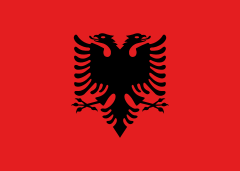Please tell us which country and city you'd like to see the weather in.

Economy of Albania
The economy of Albania has undergone a transition from its Communist past into an open-market economy since the early 1990s. The country is rich in natural resources, and the economy is mainly bolstered by agriculture, food processing, lumber, oil, cement, chemicals, mining, basic metals, hydro power, tourism, textile industry, and petroleum extraction. As of 2014, exports seem to gain momentum and have increased 300% from 2008, although their contribution to the gross domestic product is still moderate (the export of products per capita as of 2014 is around $1,100 ).
History
The collapse of communism in Albania came later and was more chaotic than in other Eastern European countries and was marked by a mass exodus of refugees to Italy and Greece in 1991 and 1992. The country attempted to transition to autarky, but this eventually failed badly. Attempts at reform began in earnest in early 1992 after real GDP fell by more than 50% from its peak in 1989. Albania currently suffers from high organised crime and corruption rates.

Albania
Albania (![]() i/ælˈbeɪniə/, al-BAY-nee-ə, or sometimes /ɔːlˈbeɪniə/, awl-BAY-nee-ə; Albanian: Shqipëri/Shqipëria; Gheg Albanian: Shqipni/Shqipnia, Shqypni/Shqypnia), officially known as the Republic of Albania (Albanian: Republika e Shqipërisë; Albanian pronunciation: [ɾɛpuˈblika ɛ ʃcipəˈɾiːs]), is a country in Southeastern Europe. It is bordered by Montenegro to the northwest, Kosovo to the northeast, the Republic of Macedonia to the east, and Greece to the south and southeast. It has a coast on the Adriatic Sea to the west and on the Ionian Sea to the southwest. It is less than 72 km (45 mi) from Italy, across the Strait of Otranto which connects the Adriatic Sea to the Ionian Sea.
i/ælˈbeɪniə/, al-BAY-nee-ə, or sometimes /ɔːlˈbeɪniə/, awl-BAY-nee-ə; Albanian: Shqipëri/Shqipëria; Gheg Albanian: Shqipni/Shqipnia, Shqypni/Shqypnia), officially known as the Republic of Albania (Albanian: Republika e Shqipërisë; Albanian pronunciation: [ɾɛpuˈblika ɛ ʃcipəˈɾiːs]), is a country in Southeastern Europe. It is bordered by Montenegro to the northwest, Kosovo to the northeast, the Republic of Macedonia to the east, and Greece to the south and southeast. It has a coast on the Adriatic Sea to the west and on the Ionian Sea to the southwest. It is less than 72 km (45 mi) from Italy, across the Strait of Otranto which connects the Adriatic Sea to the Ionian Sea.
The modern-day territory of Albania was at various points in history part of the Roman provinces of Dalmatia (southern Illyricum), Macedonia (particularly Epirus Nova), and Moesia Superior. The modern Republic became independent after the collapse of the Ottoman Empire in Europe following the Balkan Wars. Albania declared independence in 1912 and was recognized the following year. It then became a Principality, Republic, and Kingdom until being invaded by Italy in 1939, which formed Greater Albania. The latter eventually turned into a Nazi German protectorate in 1943. The following year, a socialist People's Republic was established under the leadership of Enver Hoxha and the Party of Labour. Albania experienced widespread social and political transformations during the communist era, as well as isolationism from much of the international community. In 1991, the Socialist Republic was dissolved and the Republic of Albania was established.
Albania (placename)
The toponym Albania may indicate several different geographical regions: a country in the Balkans; an ancient land in the Caucasus; as well as Scotland, Albania being a Latinization of a Gaelic name for Scotland, Alba. This article will cover etymology, as well as trace the usage of the toponyms and related toponyms and ethnonyms from their earliest known occurrence down to present times.
Albania (Caucasus)
Albania as the name of Caucasian Albania, a state and historical region of eastern Caucasus, that existed on the territory of present-day republic of Azerbaijan (where both of its capitals were located) and partially southern Dagestan.
However, unlike the names of the other two European countries, this name was an exonym given to them by the Romans, as no one knew what these inhabitants called themselves. Compare also the land in Caucasus called Iberia, with the Iberian peninsula in Europe.
Albania (Balkans)
Albania as the name of a region in the Balkans attested in Medieval Latin. It may derive from an ethnonym, Albanoi, the name of an Illyrian tribe. Some linguists propose a derivation from the Proto-Indo-European root *albho-, which meant 'white'; referring perhaps to the snow-capped mountains of Albania. Others think the source may be a non-Indo-European root *alb-, meaning "hill, mountain", also present in alp "mountain pasture".
Albania (disambiguation)
Albania is an independent state on the Balkan Peninsula in south-eastern Europe.
Albania may also refer to :
States and state subdivisions (Albania-related)
Radio Stations - Tirana
SEARCH FOR RADIOS
Podcasts:
Albania
ALBUMS
- Remember II released:

